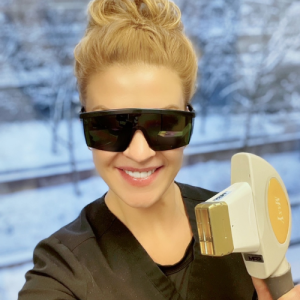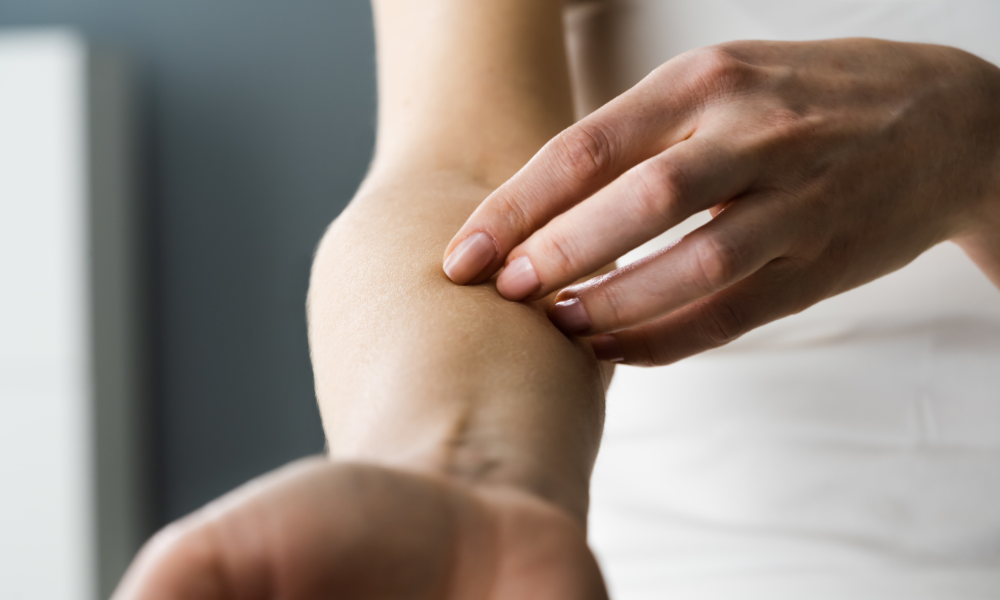October is Eczema Awareness Month
- Eczema is a chronic inflammatory condition of the skin that causes redness, itching, scaling, and dryness.
- It can be a lifelong condition starting in childhood or develop later in life and can range from mild to severe.
- It is more common in Colorado’s dry climate.
- If you are suffering from eczema, take charge of your skin’s health by learning more about this condition and the available treatment options at Pure Dermatology Denver.
TYPES OF ECZEMA
- Atopic dermatitis (the most common type)
- Hereditary, runs in families and often starts in childhood but can develop later in life.
- Symptoms include dry, scaly, itchy patches on the skin, usually in areas like the inside of elbows, backs of knees, wrists, ankles, face, and neck.
- Contact dermatitis (irritant and allergic)
- It occurs when the skin reacts to irritants or allergens it is exposed to.
- Symptoms include a localized red, itchy rash.
- Common triggers include cosmetic products, certain metals, fragrances, and plants such as poison ivy, etc.
- Dyshidrotic eczema
- Hereditary, occurs at any age.
- Causes tiny blisters and scaling on hands, feet, and fingers that tend to come and go.
- Asteatotic eczema
- Due to excessively dry skin.
- Patches of red scaly and sometimes itchy skin scattered on the body, arms, and legs.
SYMPTOMS OF ECZEMA
- Itching: Can be mild or severe, and may worsen at night. The more you scratch, the more it itches, and can lead to skin damage and infection.
- Redness: Areas affected by eczema often appear pink or red and inflamed.
- Dryness: The skin tends to be very dry, cracked, and scaly. Lack of moisture is a key problem in eczema.
- Flaking/scaling: Flaking and peeling of the outer skin layers is common, especially after scratching.
- Lichenification: Thickening of the skin, usually as a result of chronic rubbing or scratching.
- Cracked skin: The dryness associated with eczema can cause the skin to crack open painfully. Common on fingertips, hands, and feet.
- Skin discoloration: Affected areas may turn lighter or darker than their normal skin tone.
ECZEMA TREATMENTS
- Rx topical corticosteroids creams
- First-line treatment anti-inflammatory creams and ointments that reduce inflammation and itch.
- They work quickly and are great for intermittent short-term treatment.
- Rx topical non-steroidal creams
- Great new options available that are safe and effective.
- Perfect for maintenance of eczema to avoid long-term effects of topical steroids.
- Moisturizers
- Daily moisturization with a hydrating cream (not lotion) is key to the treatment and prevention of the recurrence of eczema, especially in dry Colorado weather.
- Favorites: Cetaphil Moisturizing Cream, CeraVe Moisturizing Cream, Eucerin Eczema Relief Cream.
- Systemic medications
- For severe cases and cases that are difficult to control with topical treatments.
- Oral and injectable medication options that can be life-changing for people with chronic eczema.
Our team of board-certified dermatologists and aestheticians will educate you on proper prescription and over the counter skin care and how to identify and avoid triggers. If you have questions about what products or treatments are right for you, schedule an appointment with our team.
PRODUCT RECOMMENDATIONS

EltaMD Moisture Rich Body Crème
- Colorado dry weather makes it hard to avoid dry skin. You will absolutely love the feel and effects of this cream!

EltaMD So Silky Hand Crème
- The perfect product to carry around in your purse or keep on your desk or in your car to use multiple times per day. It is moisturizing but not greasy or sticky.
Stop by Pure Dermatology to test or purchase either of these great products!
AESTHETICIAN CORNER

Treatment Spotlight – IPL (Intense Pulsed Light)
It may be helpful for managing atopic dermatitis and other types of eczema characterized by skin inflammation, especially when standard topical steroids have not been fully effective.
IPL emits wavelengths of light that target hemoglobin in dilated blood vessels associated with inflammation. This helps reduce redness, swelling, and irritation.
Treatment involves multiple sessions spaced several weeks apart. A handheld wand is used to deliver pulses of light to affected areas of skin for just seconds at a time. Sessions last 15-30 minutes, depending on the area size.
IPL Benefits:
- Non-invasive
- Non-ablative
- Reduces inflammation
- Kills bacteria
- Smoothes skin surface
- Promotes collagen production
- Minimal downtime
Schedule a FREE aesthetician consult to see if IPL would be a good treatment option to reach your skin care goals.

